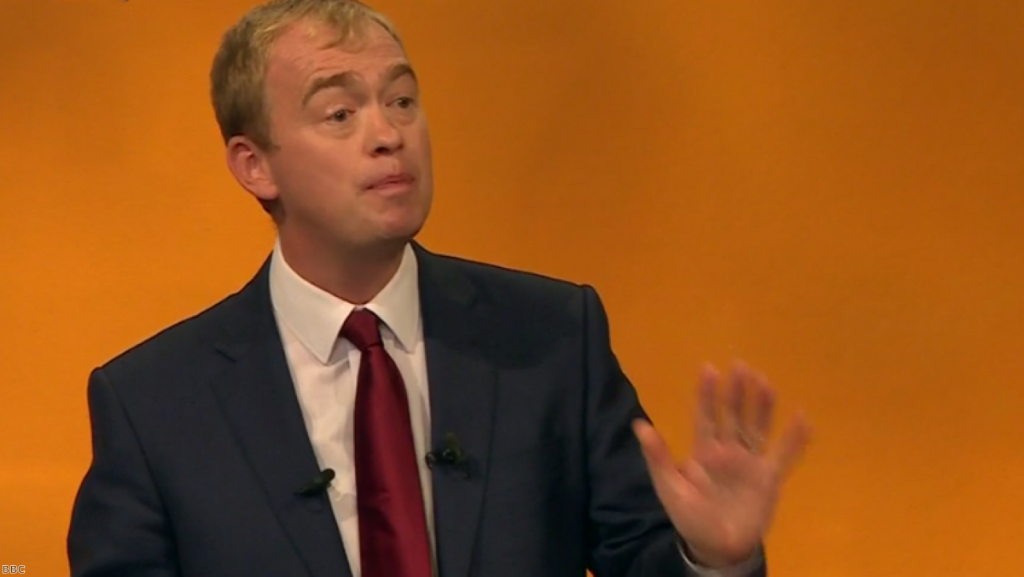Farron’s speech was brilliantly delivered – but terribly misjudged
Tim Farron has always been an excellent orator, but something about leadership has taken him up a level.
His keynote address to the Lib Dem conference was a masterclass. He got the comedy beats right and he got the rousing rhetoric right. He knew when to stop for applause and when to use it as backdrop. It was powerful stuff, and then it was genuinely funny, and then it was powerful again.
Farron doesn't photograph well, as those much-shared images of him looking afraid of milk cartons attest. He doesn't interview particularly well either, as his less-than ideal moment on the Today programme showed on Monday. But he can get on a stage and keep an audience in the palm of his hand.
The Lib Dems needed it and were grateful for it. They all seemed genuinely enthused afterwards, although they are such a resolutely upbeat lot it can be hard to tell. Farron knew how to stroke their belly. And that's not to underestimate what he did here. These people had been hammered by the public, decimated in parliament and faced an existential crisis. They needed to be told why they were doing it and to be offered some hope for the future. Farron offered it. From housing, to opportunity, to the refugee crisis, he gave an honest account of what liberalism looks like, both in terms of policy and rhetoric. His confidence lent some credibility to the notion that they could find themselves back in power sooner rather than later, even if, once you were outside the hall, it soon seemed impossible once more.


The refugee section involved soaring rhetoric and brought the audience to its feet for a protracted standing ovation. A few people on Twitter said they had to wipe tears from their eyes. It was brilliantly delivered and genuinely impassioned, but it was also impressive for its clever symbolic value. Farron's demand that the UK government sign up to EU quotas on refugee allocation and properly fund local authorities so the new arrivals do not stir up an us-versus-them mentality neatly encapsulated the Lib Dem commitment to internationalism and localism.
So on this level the speech was an extraordinary success. But what it did not do – and what this conference failed to do – is speak to the audience outside the Bournemouth International Conference centre. As was clear from the moment the pre-speech briefings to the media came out, this was a continuity Clegg speech.
There would be no break with the past. Farron, as other Lib Dem big beasts this conference had done, alluded to mistakes in government, but he did not say what they were. There would be no reboot, no apologies, no frank admissions of failure.

Tim Farron's speech went down well in the hall but ignored the wider electorate
Of course, admitting past mistakes doesn't always work. The Labour admission of failing at bank regulation hardly did them any good. But that was mid-term, in a position defined by their opponents. This was the first chapter, Farron's first big moment as a new leader. It was an opportunity to jettison the mistakes of the past and embrace what could be salvaged, to tell a new story. But there is no new story. Every single line of this could have been delivered by Nick Clegg.
That's a grave strategic error. It is a de facto slap in the face to the electorate, who so recently made it clear, in no uncertain terms, that they did not think highly of the Lib Dem performance in government. By failing to engage with that, Farron – and most party members – are implicitly saying they were right and the public were wrong. You can sense that thought in the language which dominated this conference, from Clegg's talk of "buyers remorse" to Farron's insistence to people who were not in the party that "guess what, you're a liberal".
This speech desperately needed a mea culpa, a break with the past, a first step towards changing the public perception of the Lib Dems as shameless two-faced car salesmen who'll do anything for power. As it happens, that appraisal is desperately unfair. But unfair or not it exists and Farron's speech did nothing to address it.
This entire conference has been like a parallel world in which the events of last May didn't happen. To call it complacent is not enough. It is borderline suicidal. Farron was one of the most perceptive critics of the coalition performance ahead of the election, albeit mostly because Charles Kennedy chose to keep his criticisms to himself on a day-to-day basis. He has thrown away that advantage in a bid to hold the line steady, keep Clegg and his allies onside and take advantage of Labour's sudden move to the left. Truth is, he could have had his cake and eaten it too. By acknowledging the errors of coalition, he could speak to inside and outside the hall at once. Instead, he chose only to do the former.
As exquisitely delivered and well-crafted as it was, this speech was a major missed opportunity.

